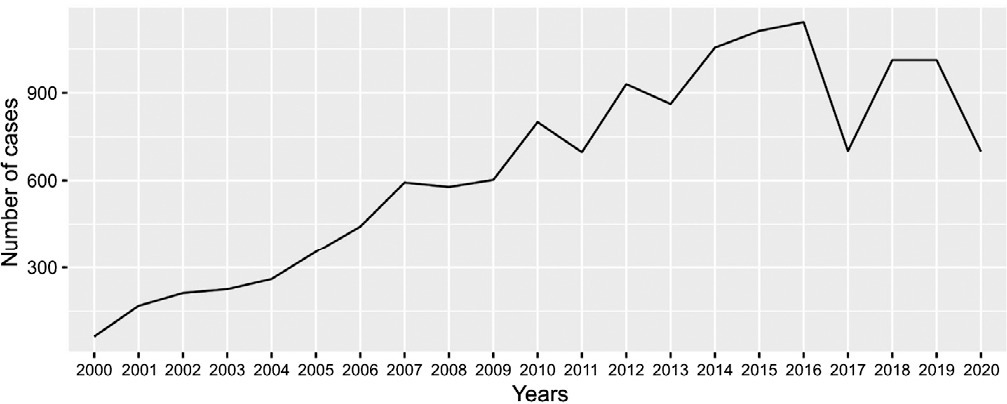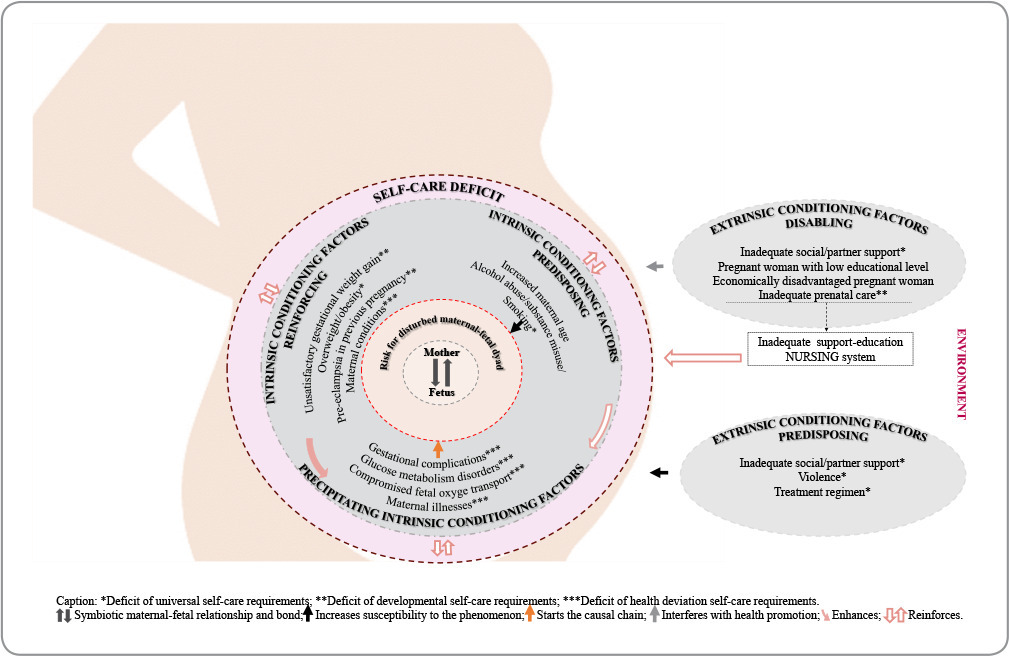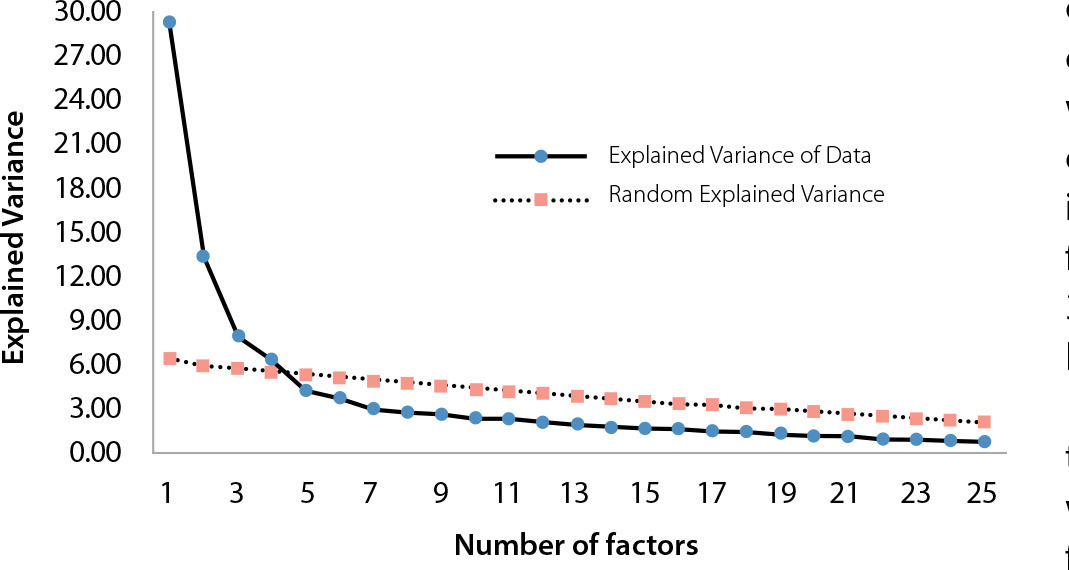-
ORIGINAL ARTICLE07-29-2024
Contribution of informal caregivers to self-care in individuals with heart failure
Revista Brasileira de Enfermagem. 2024;77(3):e20230492
Abstract
ORIGINAL ARTICLEContribution of informal caregivers to self-care in individuals with heart failure
Revista Brasileira de Enfermagem. 2024;77(3):e20230492
DOI 10.1590/0034-7167-2023-0492
Views0See moreABSTRACT
Objectives:
to evaluate the contribution of informal caregivers to the self-care of individuals with heart failure.
Methods:
a cross-sectional study was conducted with 87 caregivers from March to October 2022 in the city of João Pessoa/PB. The caregivers’ contribution was assessed using the Caregiver Contribution to Self-Care of Heart Failure Index instrument. Scores ≥ 70 points indicate adequate contribution. Data were analyzed using descriptive statistics and Spearman’s correlation.
Results:
the sample consisted of 81.6% female caregivers. Median scores obtained for the self-care contribution scales were: 63.3 for maintenance; 55.5 for management; and 66.6 for confidence. Caregivers never or rarely recommended monitoring body weight, regular physical exercise, extra use of diuretics, and fluid restriction.
Conclusions:
informal caregivers showed inadequate contribution in the areas of maintenance, management, and confidence in self-care of individuals with heart failure.
-
07-29-2024
Reflections on theoretical framework use in nursing research
Revista Brasileira de Enfermagem. 2024;77(3):e20230486
Abstract
Reflections on theoretical framework use in nursing research
Revista Brasileira de Enfermagem. 2024;77(3):e20230486
DOI 10.1590/0034-7167-2024-0486
Views0See moreABSTRACT
Objectives:
to reflect on theoretical framework use in nursing research.
Methods:
a theoretical-reflexive study, based on concepts and constructs pertinent to using nursing theories and other sciences, considering issues of epistemology or philosophy of science.
Results:
we presented what it is and why to do nursing research and what a theoretical framework is and why to use it, in addition to some considerations regarding theoretical framework use in nursing research, essential for constructing disciplinary knowledge, which enables the materialization of researchers’ work and the presentation of propositions resulting from investigations in and for nursing as a discipline and science.
Final Considerations:
based on a reflection based on epistemological conceptions, it is possible to affirm that a theoretical framework is the core of researchers’ thinking, delimiting a problem to be investigated and, based on it, outlining methodological strategies to be followed, supporting nursing action and thinking as discipline and science.

-
REVIEW07-29-2024
Nursing diagnoses for people hospitalized with heart failure: an integrative review
Revista Brasileira de Enfermagem. 2024;77(3):e20230471
Abstract
REVIEWNursing diagnoses for people hospitalized with heart failure: an integrative review
Revista Brasileira de Enfermagem. 2024;77(3):e20230471
DOI 10.1590/0034-7167-2023-0471
Views0See moreABSTRACT
Objectives:
to identify in the literature the main nursing diagnoses according to the NANDA-I diagnostic classification for people hospitalized with heart failure.
Methods:
an integrative literature review, carried out in February 2019 and updated in July 2023, in the MEDLINE via PubMed, LILACS, SciELO and CINAHL databases. Given the use of acronym PEO, studies without a time cut in Portuguese, English and Spanish were included. Descriptive analysis was carried out to present the identified information.
Results:
analysis of 27 articles identified 24 nursing diagnoses, with emphasis on Decreased Cardiac Output, Excessive Fluid Volume, Decreased Activity Tolerance and Fatigue.
Final Considerations:
evidence can contribute to better diagnostic decisions centered on people with heart failure in search of more assertive health results and have the potential to support future studies on a possible syndromic pattern in this population.

-
ORIGINAL ARTICLE07-29-2024
Primary Health Care in transitional care of people with stroke
Revista Brasileira de Enfermagem. 2024;77(3):e20230468
Abstract
ORIGINAL ARTICLEPrimary Health Care in transitional care of people with stroke
Revista Brasileira de Enfermagem. 2024;77(3):e20230468
DOI 10.1590/0034-7167-2024-0468
Views0See moreABSTRACT
Objectives:
to understand the role of Primary Health Care teams in caring for people with stroke after hospital discharge.
Methods:
single case study, with integrated units of analysis, with a qualitative approach. Data triangulation occurred through interviews with professionals and family caregivers involved in transition of care, in addition to direct observations in rounds and document analysis. For the analyses, the analytical strategies of theoretical propositions and construction of explanations were used, with the help of ATLAS.ti®.
Results:
the importance of counter-referral, the role of community health workers and the multidisciplinary team, health promotion, secondary prevention, home visits as a visceral attribute and nurses as care managers are evident.
Final Considerations:
the high demand on teams and the Social Determinants of Health interfere with adequate continuity of care. Transitional care programs that enable continuity of care are recommended.
-
ORIGINAL ARTICLE07-29-2024
Completeness of variables in Hospital-Based Cancer Registries for prostatic malignant neoplasm
Revista Brasileira de Enfermagem. 2024;77(3):e20230467
Abstract
ORIGINAL ARTICLECompleteness of variables in Hospital-Based Cancer Registries for prostatic malignant neoplasm
Revista Brasileira de Enfermagem. 2024;77(3):e20230467
DOI 10.1590/0034-7167-2023-0467
Views0See moreABSTRACT
Objectives:
to analyze the completeness of variables from Hospital-Based Cancer Registries of cases of prostate neoplasm in the Oncology Care Network of a Brazilian state between 2000 and 2020.
Methods:
an ecological time series study, based on secondary data on prostate cancer Hospital-Based Cancer Registries prostate. Data incompleteness was classified as excellent (<5%), good (between 5%-10%), fair (10%-20%), poor (20%-50%) and very poor (>50%), according to the percentage of lack of information.
Results:
there were 13,519 cases of prostate cancer in the Hospital-Based Cancer Registries analyzed. The variables “family history of cancer” (p<0.001), “alcoholism” (p<0.001), “smoking” (p<0.001), “TNM staging” (p<0.001) had a decreasing trend, while “clinical start of treatment” (p<0.001), “origin” (p=0.008) and “occupation” (p<0.001) indicated an increasing trend.
Conclusions:
most Hospital-Based Cancer Registries variables showed excellent completeness, but important variables had high percentages of incompleteness, such as TNM and clinical staging, in addition to alcoholism and smoking.

-
ORIGINAL ARTICLE07-29-2024
Disrupted mother-fetus dyad risk in high-risk pregnancies: a Middle-Range Theory
Revista Brasileira de Enfermagem. 2024;77(3):e20230464
Abstract
ORIGINAL ARTICLEDisrupted mother-fetus dyad risk in high-risk pregnancies: a Middle-Range Theory
Revista Brasileira de Enfermagem. 2024;77(3):e20230464
DOI 10.1590/0034-7167-2023-0464
Views0See moreABSTRACT
Objectives:
to develop and evaluate a Middle-Range Theory for the nursing diagnosis “Disrupted Mother-Fetus Dyad Risk” in high-risk pregnancies.
Methods:
this methodological study was conducted in two stages: theory development and evaluation. Dorothea Orem’s General Nursing Model was used as the theoretical-conceptual foundation. Evaluation was conducted using the Delphi method with seven judges, and consensus was achieved when the Content Validity Index of the evaluated items was ≥ 0.80.
Results:
the theory identified 20 elements of the nursing diagnosis “Disrupted Mother-Fetus Dyad Risk” (10 risk factors, 4 at-risk populations, and 6 associated conditions), 14 propositions, and 1 pictogram. After two rounds of evaluation, the theory was considered consistent, with consensus reached for all items, each achieving a Content Validity Index ≥ 0.80.
Conclusions:
the Middle-Range Theory included biopsychosocial factors explaining the nursing phenomenon “Disrupted Mother-Fetus Dyad Risk,” which aids in nurses’ diagnostic reasoning.

-
ORIGINAL ARTICLE07-29-2024
Mental health of parents of children and adolescents who require special health care
Revista Brasileira de Enfermagem. 2024;77(3):e20230457
Abstract
ORIGINAL ARTICLEMental health of parents of children and adolescents who require special health care
Revista Brasileira de Enfermagem. 2024;77(3):e20230457
DOI 10.1590/0034-7167-2023-0457
Views0See moreABSTRACT
Objective:
To identify the manifestations presented by parents of children and adolescents who require special health attention that can impact their mental health.
Methods:
exploratory, qualitative research, based on the concept of vulnerability, with data collection carried out through interviews with 18 parents of children and adolescents with special health care needs, hospitalized in the pediatric ward of a hospital in Paraná, between May/2017 and May/ 2018. Data analyzed by inductive thematic analysis.
Results:
parents experienced situations of vulnerability when providing care at home, with repercussions on their mental health, expressed by manifestations of lack of protection, anxiety and depression.
Final considerations:
It is important that health professionals seek to expand actions to promote care and reduce situations that generate threats, insecurities, concerns and damage to the health of parents, which can impact and further weaken care for children and adolescents who need attention especially health.
-
ORIGINAL ARTICLE07-29-2024
Evidence of validity of the Risk Self-Medication Questionnaire focused on Health Literacy
Revista Brasileira de Enfermagem. 2024;77(3):e20230386
Abstract
ORIGINAL ARTICLEEvidence of validity of the Risk Self-Medication Questionnaire focused on Health Literacy
Revista Brasileira de Enfermagem. 2024;77(3):e20230386
DOI 10.1590/0034-7167-2023-0386
Views0See moreABSTRACT
Objectives:
to analyze the validity evidence of the internal structure of the Risk Self-Medication Questionnaire Focused on Health Literacy.
Methods:
a psychometric study with 499 adults. The internal structure was assessed with exploratory and confirmatory factor analysis to prove the adjustment. Internal consistency was measured by composite reliability and McDonald’s omega coefficient (ω).
Results:
the parameters revealed a model of 35 items distributed across four factors, explaining 56% of the total variance, with factor loadings ranging from 0.31 to 0.85 and adequate communalities. Accuracy (0.79
Conclusions:
an instrument was obtained with good evidence of structural validity for measuring self-medication.

-
ORIGINAL ARTICLE10-05-2020
Professional master program: Preparing the nurse of the future
Revista Brasileira de Enfermagem. 2020;73:e20200007
Abstract
ORIGINAL ARTICLEProfessional master program: Preparing the nurse of the future
Revista Brasileira de Enfermagem. 2020;73:e20200007
DOI 10.1590/0034-7167-2020-0007
Views0See moreABSTRACT
Objective:
Analyze the results of knowledge production from a graduate program for master’s degree in nursing.
Method:
This is a qualitative retrospective documentary study. Data were collected from the university library repository and the program website. In total, 83 dissertations were found, analyzed and arranged into five groups: worker’s health, care management, systematization of nursing care, health education, and nursing care.
Results:
The results indicate good practices such as manuals, guides, protocols, software, and products for systematization of care. They indicate concern about changing the reality with care practices and interventions, health education and continuing education.
Final considerations:
This study showed student commitment to the fields of practice when choosing the project theme. Students presented an intention to improve care, management, education and research, in the various dimensions of the profession.
-
ORIGINAL ARTICLE12-07-2020
Construction and validation of an educational gerontotechnology on frailty in elderly people
Revista Brasileira de Enfermagem. 2020;73:e20200800
Abstract
ORIGINAL ARTICLEConstruction and validation of an educational gerontotechnology on frailty in elderly people
Revista Brasileira de Enfermagem. 2020;73:e20200800
DOI 10.1590/0034-7167-2020-0800
Views0See moreABSTRACT
Objective:
to construct and validate an educational gerontechnology on frailty in elderly people.
Method:
a methodological study developed in three stages: educational video construction, validation by expert judges and elderly people. Validation was carried out by 22 judges and 22 elderly people. Educational Content Validation Instrument was used for judges and questions adapted from the Suitability Assessment of Materials questionnaire for elderly people. For validation, agreement criterion greater than 80% was considered, verified using Content Validation Index and binomial test.
Results:
the video addresses recommendations for elderly people at risk of frailty and health-promoting habits, using cordel literature. An agreement greater than 80% was verified in all items assessed by judges and the target audience.
Conclusion:
the video proved to be valid in terms of content and appearance by judges and elderly people, with the potential to mediate health-promoting educational practices in healthy aging.

-
ORIGINAL ARTICLE07-06-2020
Vulnerability in the health of young transgender women living with HIV/AIDS
Revista Brasileira de Enfermagem. 2020;73(5):e20190046
Abstract
ORIGINAL ARTICLEVulnerability in the health of young transgender women living with HIV/AIDS
Revista Brasileira de Enfermagem. 2020;73(5):e20190046
DOI 10.1590/0034-7167-2019-0046
Views0See moreABSTRACT
Objectives:
to analyze the health vulnerability of young female transgender living with HIV/AIDS.
Methods:
qualitative, descriptive, and exploratory study, based on the theoretical reference of Social Representation and concept of vulnerability; developed with six transgender women in a reference Hospital for HIV/AIDS. We analyzed the individual interviews, recorded, and transcribed in full, in the IRaMuTeQ software by Similitude Analysis.
Results:
the thematic categories are listed based on the Ayres reference: 1) Individual dimension of vulnerability to HIV/AIDS; 2) Social dimension of vulnerability to HIV/AIDS; 3) Programmatic dimension of the vulnerability.
Final Considerations:
the young female transsexual living with HIV/AIDS experience a context of vulnerability in health associated with a lack of knowledge and difficulties for the realization of self-care. The study evidenced the representations of social abjection and unpreparedness of the health team that compose the Primary Attention in Health in promoting qualified assistance for the execution of the effective and humanized care.
-
EXPERIENCE REPORT07-31-2020
(In)visibility of children with special health needs and their families in primary care
Revista Brasileira de Enfermagem. 2020;73:e20190071
Abstract
EXPERIENCE REPORT(In)visibility of children with special health needs and their families in primary care
Revista Brasileira de Enfermagem. 2020;73:e20190071
DOI 10.1590/0034-7167-2019-0071
Views0See moreABSTRACT
Objectives:
to discuss the (in)visibility of children with special healthcare needs and their families in the Primary Health Care scenario.
Methods:
experience report about the difficulties faced by researchers from different regions of Brazil to locate children with special healthcare needs in the scope of primary care.
Results:
the main reason for these children and their families to be “unknown” and, therefore, not assisted in PHC, is the fact that they are followed-up by institutions/outpatient clinics and specialized and/or public rehabilitation clinics, or even because they have private health insurance.
Final Considerations:
transferring care responsibility to the Primary Health Care teams to specialized and rehabilitation institutions may be related to the lack of knowledge of the care demands of this group, as well as to the relevance of care centered on rehabilitation and the specialty instead of the long-term care, one of the features of primary health care.
-
03-19-2021
Validity and reliability of Kessler Psychological Distress Scale for Brazilian elderly: a cross-sectional study
Revista Brasileira de Enfermagem. 2021;74:e20200365
Abstract
Validity and reliability of Kessler Psychological Distress Scale for Brazilian elderly: a cross-sectional study
Revista Brasileira de Enfermagem. 2021;74:e20200365
DOI 10.1590/0034-7167-2020-0365
Views0See moreABSTRACT
Objective:
to verify the validity and reliability of the Psychological Distress Scale for screening mental distress.
Methods:
a cross-sectional study with 75 elderly people. Psychological Distress scale and Self Reporting Questionnaire were used. Criterion validity was verified using Spearman’s correlation and diagnostic accuracy measures. Cronbach’s alpha coefficient was used to investigate reliability.
Results:
the total internal consistency of the Psychological Distress Scale was α=0.844. Concurrent validity between this instrument and the Self Reporting Questionnaire was ρ=0.722 (p<0.001). The best cut-off point for screening mental distress among elderly people was a total score greater than 14, with sensitivity equal to 75.47% and specificity equal to 85.0%.
Conclusions:
the scale was robust for screening mental distress, given its high reliability, in terms of homogeneity, and adequate criterion validity, whose best cut-off point for screening was a score greater than 14.
-
ORIGINAL ARTICLE10-21-2019
Hand hygiene: knowledge and skill of caregivers in the hematopoietic stem cell transplantation
Revista Brasileira de Enfermagem. 2019;72(6):1653-1662
Abstract
ORIGINAL ARTICLEHand hygiene: knowledge and skill of caregivers in the hematopoietic stem cell transplantation
Revista Brasileira de Enfermagem. 2019;72(6):1653-1662
DOI 10.1590/0034-7167-2018-0788
Views0See moreABSTRACT
Objective:
to identify the knowledge and ability of caregivers on hand hygiene in hematopoietic stem cell transplantation.
Method:
a prospective cross-sectional study. A questionnaire was used to identify the knowledge and it was observed the hygiene technique performance. Data were collected in two units (autologous and allogeneic transplant).
Results:
the 37 participants recognized the importance of hand hygiene and 95.5% related to removal of dirt or infection prevention. 91.9% stated that it was important to clean their hands with soap and water when entering and leaving the room, and 64.9% understood that it was necessary to apply alcoholic solution after washing. On average, the caregivers scored 6.16 steps, when demonstrating the washing technique and 3.91 steps in the friction with alcoholic solution.
Conclusion:
although they recognize the importance of the procedure, there are deficits related to the moment and the correct way of doing it, evidencing the need for strategies aimed at improving this process.
-
ORIGINAL ARTICLE07-31-2020
Pain assessment in pediatrics
Revista Brasileira de Enfermagem. 2020;73:e20190109
Abstract
ORIGINAL ARTICLEPain assessment in pediatrics
Revista Brasileira de Enfermagem. 2020;73:e20190109
DOI 10.1590/0034-7167-2019-0109
Views0See moreABSTRACT
Objectives:
to investigate how the pain assessment and management process in pediatric patients is performed and suggestions for its improvement.
Methods:
exploratory, qualitative study. Nine professionals from the nursing team of a pediatric hospital unit in Porto Alegre/RS participated in the study. A sociodemographic questionnaire and semi-structured interviews were used with content analysis.
Results:
the results reinforced the importance of pain assessment with family participation and the need to use tools and process improvements in the training and sensitization of professionals.
Final Considerations:
after the study was concluded, there was a clear need to address the issue, highlighting its relevance for pain resolution in pediatric patients.
-
ORIGINAL ARTICLE10-21-2019
Perception of health professionals about neonatal palliative care
Revista Brasileira de Enfermagem. 2019;72(6):1707-1714
Abstract
ORIGINAL ARTICLEPerception of health professionals about neonatal palliative care
Revista Brasileira de Enfermagem. 2019;72(6):1707-1714
DOI 10.1590/0034-7167-2018-0842
Views0See moreABSTRACT
Objective:
To identify the perception of health professionals about neonatal palliative care.
Method:
A phenomenological qualitative study, a non-probabilistic sample, of 15 health professionals from a neonatal intensive care unit in northern Portugal. Content analysis was performed.
Results:
Despite their lack of training in palliative care, the health professionals showed concern for the dignity, quality of life and comfort of the newborn and family. They expressed emotional and relational difficulties in following the trajectories of serious illness and death and in the ethical decisions regarding the end-of-life.
Conclusion:
It is emphasized that professionals are sensitive to pain and suffering and reveal dedicated and committed in the care of the newborn and family. They are available to train and embrace the current challenges posed by the constitution of pediatric palliative care teams and to help achieve an organizational culture that advances in such care.
Search
Search in:
Nuvem de Tags
Adolescente (85) Atenção Primária à Saúde (239) COVID-19 (91) Criança (91) Cuidados de Enfermagem (269) Educação em Enfermagem (151) Educação em Saúde (139) Enfermagem (930) Enfermagem Pediátrica (86) Estudantes de Enfermagem (77) Estudos de Validação (131) Família (87) Idoso (208) Promoção da Saúde (99) Qualidade de Vida (104) Saúde do Trabalhador (86) Saúde Mental (145) Saúde Pública (82) Segurança do Paciente (150) Tecnologia Educacional (100)



